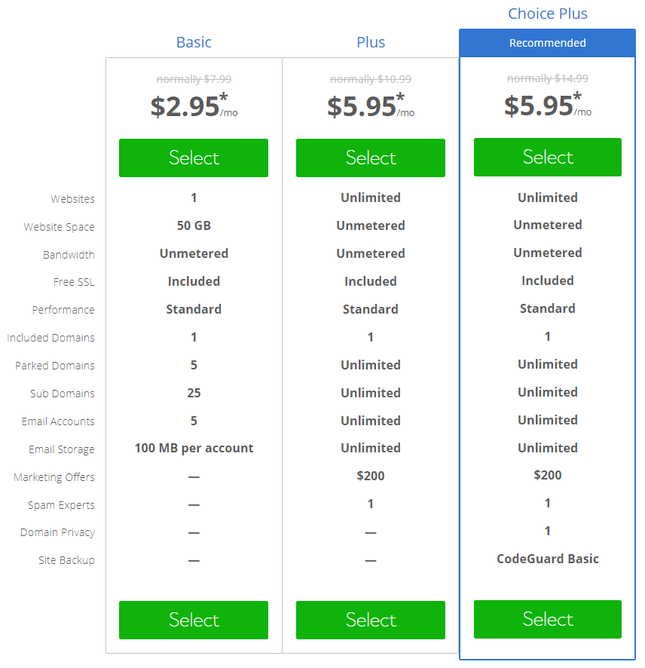SiteGround vs Bluehost: Which One Should You Choose?
Our independent research projects and impartial reviews are funded in part by affiliate commissions, at no extra cost to our readers. Learn more
We’ve compared hosting providers and Bluehost scores higher in our research rankings than SiteGround. They both have extremely strong qualities, though – otherwise they wouldn’t be leading providers!
SiteGround’s strongest hosting types are ecommerce and WordPress hosting, but in our research we found that Bluehost performs even better for both these hosting types. In fact, Bluehost comes out top for VPS, dedicated, WordPress, and ecommerce hosting. Bluehost has more to offer in terms of hosting features (such as disk space), as well as value for money.
The provider you choose will depend on what you need for your website. We’ve done our own research to compare the leading providers and help you make the right decision. So, put your feet up, and let’s dive into our in-depth comparison of SiteGround vs Bluehost.
If you’re in a rush, here’s a simple summary breakdown to help you on your way.
| BEST IN TEST | |
| Bluehost | SiteGround |
| Overall rating 4.8 | Overall rating 3.7 |
| Starting from $2.95 | Starting from $2.99 |
| Uptime 99.98% | Uptime 99.99% |
| Number of sites 1 – Unlimited | Number of sites 1 – Unlimited |
| Money-back guarantee 30 days | Money-back guarantee 30 days |
| Free backups | Free backups |
| Storage space 10GB – Unlimited | Storage space 10GB – 160GB |
| Bandwidth Unmetered | Bandwidth Unmetered |
| RAM 2GB – 16GB | RAM 16GB – 64GB |
| Visit Bluehost | Visit SiteGround |
Bluehost is better for WordPress sites…
… Alongside being the best for WordPress, if you’re in search for great features, like unmetered bandwidth, and wonderful customer support, then Bluehost is for you.
SiteGround is better for you if you have a small website…
… Because it takes out the decision fatigue and offers simplicity with strong security and a good alternative for small sites and startups.
SiteGround vs Bluehost: Quick Comparison
Want to know what categories SiteGround and Bluehost won? This chart below will walk you through each area we tested and who came out on top!
| Bluehost | SiteGround | |
|---|---|---|
| Features, Performance, & Ease of Use Winner: Bluehost | It's a close match but Bluehost wins for its fantastic features like its WordPress integrations, unmetered bandwidth, and a free domain. Plus it offers dedicated and VPS plans where SiteGround doesn't. | SiteGround offers really great shared plan features, in fact, the third best of all providers! It offers free daily backups and great security features like hack prevention and a free SSL certificate. But compared to Bluehost doesn't offer as much storage, bandwidth, or plans to move up to. |
| Pricing & Value for Money Winner: Bluehost | Bluehost's hosting plans are extremely cost-effective, especially when looking at the VPS and dedicated plans. Generally and when compared to SiteGround, Bluehost's renewal prices are very competitive. It also offers a 30-day money-back guarantee. | SiteGround introductory costs are cheap but tend to go higher than Bluehost in the long term, but its plans still won't set you back too much. Pricing between hosting types and renewals can also be fairly erratic, but it also offers a 30-day money-back guarantee. |
| WordPress integration Winner: Bluehost | Bluehost is the number one platform for WordPress management. In simply one click you can install WordPress with Bluehost, it is even recommended by WordPress itself! | SiteGround came in third rank for WordPress in both our testing and in WordPress' own recommendations. It's still a good contender, but Bluehost takes the lead again here. |
| Migration Winner: SiteGround | On Bluehost's cheapest plan you can get an expert switching service, for quite a high price. All it takes is a few clicks, and Bluehost's support team will be on hand throughout the process. | Switching with SiteGround is super simple and they offer free manual migration, alongside some paid expert help, which varies in price but could work out cheaper than Bluehost. |
| Help and Support Winner: Bluehost | Bluehost has excellent help and support options, including an awesome knowledge center, 24/7 phone, live chat, and email services. | SiteGround offers a good range of support, from phone support, a fairly good knowledge center, tickets, and a 24/7 live chat. |
| Are You Ready? | Bluehost | SiteGround |
Find out more
- Web hosting services comparison – a side-by-side comparison of six of the top web hosting providers on the market.
- Best web hosting services – an in-depth review of our top three hosting providers.
Pros & Cons
Sometimes the best way to compare providers is to do a pros and cons list. It’s good to see the strengths and weaknesses of both laid out. This way you can see which one has better options for you and your site.
SiteGround Pros
- Free daily backups
- Pretty good help and support
- Third best for WordPress (Bluehost is the best)
- Fourth best for ecommerce (Bluehost at number one)
Bluehost Pros
- Affordable and good value
- Faster uptime than SiteGround
- Recommended top host provider by WordPress
- Best for ecommerce hosting
- Best for dedicated and VPS plans
SiteGround Cons
- No dedicated or VPS plans
- Worst for server response time
- Lowest value for money score compared to competitors
- Limited storage and bandwidth
Bluehost Cons
- No backups on cheapest shared plans
- Not the best uptime on the market (better than SiteGround)
- Not the best site speed on the market
Bluehost is a more established provider, meaning that it has built up a very strong and comprehensive service. But what does this mean for you? The answer… Perks! User benefits such as the free domain, WordPress integration, and extremely good value for money are all part of Bluehost’s reliable reputation.
SiteGround has grown quickly since its start in 2004 to become a leading hosting provider. This shows in its focus on backups, security, and good ecommerce offering.
Let’s get into the details so you can learn much more about them and move towards one provider that suits you better.

Find out more
Features, Performance, & Ease of Use
The Winner
Bluehost has better features and performance
Both providers pride themselves on their ease of use and wide customer base. They are both beginner friendly but Bluehost takes the edge for its scalability. Overall Bluehost scores 4.2 out of 5 for features, while SiteGround has just 4 out of 5.
Here are some of the features available that will really influence your decision.
| Bluehost | SiteGround | |
|---|---|---|
| Free Domain | Yes | No |
| Control Panel | cPanel | cPanel |
| Free Backups | No | Yes |
| Unmetered Transfer | Yes | Yes |
| Disk Space | Unlimited | 10GB – 40GB |
| Uptime | 99.98% | 99.9% |
Domains
One of the ways Bluehost really stands out from its competitors is its offer of a free domain name, which is an attractive draw for a lot of users. It’s a great perk that is worth making the most of!
It’s worth knowing the domain is not included in the money-back guarantee – Bluehost takes a registration fee of $15.99 from your refund. This just means the domain name is definitely yours, no matter the status of your hosting service.
This means you own your domain, even if you cancel your plan with Bluehost. You can do what you want with it until renewal comes around, at which point you can either cancel it or pay for it in full.
Other Features
SiteGround includes a free domain on its shared and WordPress hosting plans, and also provides free auto daily backups on all its price plans. So what does this mean? Your data is backed up daily for 30 days, so that in a crisis you can easily restore your website, email, or files.
You have to pay extra to restore if you’re on the StartUp plan, but it becomes free when you upgrade to its GrowBig and higher tier price plans.

Both use cPanel for their interfaces, which is a well-known and reliable control panel used by hosting providers. Another feature they share is providing unmetered data transfer. Unmetered just means you’re not billed on how much you use (like having a phone contract rather than pay as you go). This is most helpful to those of you with either personal, small business or community sites.
Unmetered data transfer allows your site to grow freely, rather than being capped or “metered” once a data limit is reached. There are still limits in place (like in that phone contract), but for small sites it’s really rare to get close to hitting that level.
Performance
Uptime is great for both. This is really important because during downtime your visitors won’t be able to access your site. Some downtime is unavoidable, but with both these providers you can be sure that your site will be working hard.
An important thing to note: SiteGround has a lower uptime of 99.9%. When we tested these providers’ uptime ourselves we recorded 99.98% for Bluehost, which is a lot better than SiteGround!
Also neither of these hosts is the fastest in terms of site speed or server response time. But Bluehost was a good average overall, while SiteGround’s site speed sunk to the bottom of all the providers, scoring just 0.9 out of 5 for its shared hosting performance. In comparison, Bluehost scores 3.3 out of 5 – not the best performance score, but much better than SiteGround!

Find out more:
- Siteground vs HostGator – see how Siteground fares against hosting giant, HostGator.
- Best VPS Hosting – so you know you need VPS hosting, but who’s the best provider for the job? Read our comparison to find out.
Which has Better WordPress Integration?
The Winner
Bluehost is best for WordPress
WordPress is a major presence online – in fact, it powers 31% of the internet! It’s no surprise that many of you are either looking to build your site or are already set up with WordPress.
In our research and testing Bluehost won with an overall WordPress score of 4.6 out of 5, compared to SiteGround’s 4.3 out of 5. SiteGround had a better market analysis score, making it more popular, but Bluehost triumphed in areas such as features, value for money, and support.
WordPress itself has created a list of the hosting providers it considers to be “the best and brightest of the hosting world”. Top of the list is Bluehost, so it wins hands down. Bluehost and WordPress are the power couple of the hosting world.
Interestingly, SiteGround is the third provider on the list, making it a pretty strong rival. With only three providers listed, Bluehost usually blows this section out the water, but SiteGround is certainly up there too.
Choosing a provider for your WordPress site that doesn’t have great WordPress integration just wouldn’t make sense. It would be like taking your bicycle wheels and attaching them to your car. It won’t be a great fit, it won’t give you an easy journey, and more importantly it just won’t work!
Both SiteGround and Bluehost have a strong WordPress focus, offering one-click installation, 24/7 specialist support, auto updates, and free and easy site transfers and migrations. They pretty much attach and maintain your tyres for you – and make sure they’re top quality to give you the best experience possible!
With extra benefits for each (such as SiteGround’s tailored security and Bluehost’s free extras), either is sure to put a smile on WordPress users’ faces.

Find out more
- Bluehost Review – for an in-depth look at everything Bluehost has to offer.
- Best WordPress Hosting Provider – need a hosting platform for your WordPress site? Read our review of the best provider for the job (spolier: it’s Bluehost).
Website Migration Support
The Winner
SiteGround is better for website migration
Already have a website? Let’s take a look at which host makes it easier to move your site over to their servers.
Migrating to SiteGround
SiteGround recommends you transfer your website to its servers using its migrator plugin – there’s a guide to doing this, and it seems fairly simple. It also offers these manual migrations absolutely free, whereas Bluehost does not!
If you want an expert to carry out the migration for you, the option exists – but how much it costs isn’t super clear. What we do know is this service starts at $20-$30 per migration, which is potentially cheaper than Bluehost if not the same.
Migrating to Bluehost
Bluehost offers a free switching service for WordPress websites which fulfill its qualification criteria (which includes things like using a recent version of WordPress, and being malware-free).
Free migration is a huge plus, but unfortunately you’ll only find out if you qualify after you sign up for an account (although remember you’ve always got your 30-day money-back guarantee to fall back on):
- Sign up for a Bluehost plan
- Fill out the ‘free migration contact form’ in your Bluehost dashboard
- Bluehost’s team will be in touch.
Free migrations will take 2-3 business days to complete. If your site doesn’t qualify, you have the option to pay a one-off fee of $149.99 to migrate your website. This is more comprehensive, including up to five websites and 20 email accounts (email accounts aren’t included in the free migration).

Customer Support
The Winner
Bluehost has better help and support
Running a site is fun, but sometimes challenging. The last thing you want to be doing is spending precious hours trying to fix problems and put out fires. It’s frustrating! That’s why it’s important to choose a great provider so that these problems don’t happen.
Customer support is your safety net and you don’t want big holes in it! If you look at the table below, you’ll see that both SiteGround and Bluehost are there to catch you if you fall.
| Bluehost | SiteGround | |
|---|---|---|
| Knowledge Center | Yes | Yes |
| Live Chat | Yes | Yes |
| 24/7 Live Chat | No | Yes |
| Phone | Yes | Yes |
| 24/7 Phone | Yes | No |
| Tickets | Yes | Yes |
| Yes | No |
You can always be sure that leading competitors like Bluehost and SiteGround will have excellent customer support in place. They rely on happy users like you for their reputation after all. The main difference is really how accessible and useful their customer support features are.
Bluehost Customer Support
Overall Bluehost has a score of 3.5 out of 5 for help and support. While Bluehost may not have as strong customer support as some of its competitors, it is definitely comprehensive in what it offers. Live chat, telephone support, and tickets means that there is something for everyone.
For those of you wondering, tickets are for problems not covered by general information online. You send a ticket request with your problem for the help team to look at and they send you a tailored solution. Bluehost’s ticket option no longer applies to tech support, but it is a really valuable personalized help feature to have in place.
The Bluehost knowledge center has different categories, such as email, WordPress, domain, relevant links to helpful articles, as well as access to the old favorite Frequently Asked Questions (FAQ) page. There is also a search bar, meaning you can tailor your results to your own needs.

SiteGround Customer Support
Although SiteGround does have 24/7 live chat and great customer support, overall SiteGround scores a 2.5 out of 5 for support, offering a less robust support offering than Bluehost.
One of the worst things about having a problem is the stress of actually trying to get it sorted. Whether that’s being on hold for hours or getting frustrated with automated responses from a supposed live chat, we’ve all been there. But never again!

SiteGround over-staffs its shifts so that they don’t keep you waiting – under each option it gives an expected response time. There are also profiles online so that you can actually see the person who’s helping you, along with their years of experience and areas of expertise.
As well as its live chat, telephone support, and ticket system SiteGround also has a knowledge base. This is broken down into sections with categories, articles, and FAQ pages there for you to browse.
Is that all? Well, not quite! SiteGround also has tutorials, webinars, a blog, and a setup wizard to cover all your needs. However, one thing SiteGround doesn’t provide that Bluehost does is email support.

Find out more
- Best Small Business Hosting – which is the best provider to host your small business website?
Pricing & Value for Money
The Winner
Bluehost is better value for money
Bluehost receives a huge overall value score of 4.7 out of 5 and SiteGround can’t really compare with a score of 1.7 out of 5. That’s because in the long run Bluehost is cheaper and you get more bang for your buck.
Whether you’re just starting out building your own website, own a small business or are an experienced entrepreneur, working to a budget and getting the most of our money is always important. You want good value, not to be throwing cash away on services you don’t need.
| Bluehost | SiteGround | |
|---|---|---|
| Shared Hosting | $2.95 – $13.95 | $2.99 – $7.99 |
| Cloud Hosting | N/A | $100 – $400 |
| WordPress Hosting | $2.95 – $13.95 | $2.99 – $7.99 |
| WooCommerce Hosting | $9.95 – $12.95 | $2.99 – $7.99 |
| VPS Hosting | $23.99 – $83.99 | N/A |
| Dedicated Hosting | $99.99 – $139.99 | N/A |
| Reseller Hosting | Outsourced for $17.99 – $49.99 | $4.99 – $100 |
Keep in mind, these prices are promotional prices available for new customers. Once you’ve finished the twelve month term you’ll then you’ll need to pay the renewal rates.
Here is where Bluehost really stands out as a money saver compared to SiteGround. For example, SiteGround’s StartUp shared plan costs $2.99 per month for the year, but after that shoots up to $14.99 per month. Comparitively the Bluehost cheapest shared plan costs $2.95 per month for the year, and then the renewal rate is just $7.99 per month.
Bluehost Pricing
As you can see, Bluehost has much more competitive prices than SiteGround in the long run. Add this to the amount of hosting and features options available, and you get really great value for money.
Alongside scoring higher overall for value, Bluehost also defeats SiteGround in WordPress and shared hosting specific scores. For shared plans Bluehost has a value score of 3.1 out of 5, beating SiteGround’s 2.4 score. Also Bluehost’s WordPress plans score 3.9 out of 5 for value, compared to SiteGround’s value score of 3.6.
Bluehost is such an established provider that it can afford to offer extra perks at low rates. This is great news for those of you on a budget, as lower tier customers still really benefit without suffering from high costs. (Just be aware of any add-ons that might nudge the price up at checkout)! Overall, Bluehost is your piggybank’s friend.

SiteGround still deserves a mention here though. What stands out with SiteGround is how much more transparent than other web hosting providers it is when it comes to additional costs. It’s really common in this industry to offer low rates, and then have a load of extra add-ons which can hike the price up at check-out.
SiteGround is less cheeky when it comes to this. For example, on the checkout page for StartUp package customers there are two add-ons: domain privacy and a SiteScanner, neither of which come pre-selected meaning it’s totally up to you if you want to add them to your plan.
SiteGround Pricing
While overall SiteGround hasn’t got the best value score, it does do well for its WordPress plans, gaining a score of 3.6 out of 5 for value. That’s thanks to free expert migration, daily backups, and the joint highest score for security features.
Its shared hosting value score on the other hand is only 2.4 out of 5, since plenty of builders offer more storage and bandwidth for shared plans.
This upfront pricing is refreshing, however it has its downside. If you are a lower tier customer with SiteGround you will have less advantages than you would with a bigger provider such as Bluehost.
Both SiteGround and Bluehost offer a 30-day money back guarantee which is a great way of offering peace of mind to new customers – if you don’t love them, leave them! Just remember that extra purchases and add-ons such as domain names are not included in the refund.
Find out more
- Best Cheap Hosting Providers – on a budget? Check out our roundup of the best cheap hosting providers.
- DreamHost Review – DreamHost offers the cheapest plans around, but are they any good? Read our review to find out.

SiteGround vs Bluehost: Summary
Overall Bluehost is our winner, coming first place with a whopping 4.8 out of 5 score because it’s perfect for sellers, bloggers, and WordPress users alike. With its impressive WordPress recommendation, ease of use, and great value for money, Bluehost is a reliable choice for beginners and pros alike.
It was a fairly one-sided battle. SiteGround has a less impressive overall score of 3.7 out of 5, quite behind Bluehost. Its extensive resources for security, cloud hosting, and taking the choice out of the amount of plans, makes it a useful alternative for start up sellers or websites.
So which one is better for you? As with anything, which provider you choose will really depend on your needs and what you value most. If you’re not on a tight budget and think that you’ll rely heavily on cloud hosting, go with SiteGround.
If you’re unsure, want great value and industry-leading WordPress hosting, or if you’re a beginner, then Bluehost is the better option for you. With its wide range of benefits, its got something for everyone.






Leave a comment